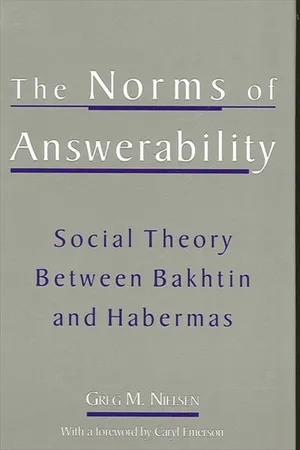
- 272 pages
- English
- PDF
- Available on iOS & Android
About this book
Explores the relevance of Bakhtin's thought to social theory.
Greg M. Nielsen brings Mikhail Bakhtin's ethics and aesthetics into a dialogue with social theory that responds to the sense of ambivalence and uncertainty at the core of modern societies. Nielsen situates a social theory between Bakhtin's norms of answerability and Jürgen Habermas's sociology, ethics, and discourse theory of democracy in a way that emphasizes the creative dimension in social action without reducing explanation to the emotional and volitional impulse of the individual or collective actor. Some of the classical sources that support this mediated position are traced to Alexander Vvedenskij's and Georg Simmel's critiques of Kant's ethics, Hermann Cohen's philosophy of fellowship, and Max Weber's and George Herbert Mead's theories of action. In the shift from Bakhtin's theory of interpersonal relations to a dialogic theory of societal events that defends the bold claim that law and politics should not be completely separated from the specificity of ethical and cultural communities, a study of citizenship and national identity is developed.
Frequently asked questions
- Essential is ideal for learners and professionals who enjoy exploring a wide range of subjects. Access the Essential Library with 800,000+ trusted titles and best-sellers across business, personal growth, and the humanities. Includes unlimited reading time and Standard Read Aloud voice.
- Complete: Perfect for advanced learners and researchers needing full, unrestricted access. Unlock 1.4M+ books across hundreds of subjects, including academic and specialized titles. The Complete Plan also includes advanced features like Premium Read Aloud and Research Assistant.
Please note we cannot support devices running on iOS 13 and Android 7 or earlier. Learn more about using the app.
Information
Table of contents
- THE NORMS OF ANSWERABILITY
- CONTENTS
- FOREWORD
- AKNOWLEDGMENTS
- INTRODUCTION: Theory on the Borders of Sociology
- 1. DIVERSITY AND TRANSCULTURAL ETHICS
- 2. COMMUNICATIVE ACTION OR DIALOGUE?
- 3. THE WORLD OF OTHER’S WORDS
- 4. ON THE SOURCES OF YOUNG BAKHTIN’S ETHICS (Kant, Vvedenskij, Simmel, Cohen)
- 5. ACTION AND EROS (Kant-Weber-Bakhtin)
- 6. REFLEXIVE SUBJECTIVITY (Mead-Bakhtin)
- 7. CITIZENSHIP AND NATIONAL IDENTITY
- 8. A DIALOGUE ON THE NATION IN POSTNATIONAL TIMES
- 9. CONCLUSION: On Culture and the Political
- NOTES
- BIBLIOGRAPHY
- INDEX